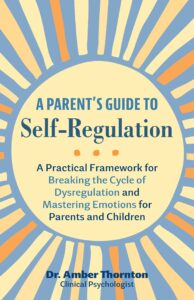A Parent’s Guide to Self-Regulation by Dr. Amber Thornton (Book Excerpt)
 Excerpted from A Parent’s Guide to Self-Regulation by Dr. Amber Thornton. Copyright © 2024 Ulysses Press. Reprinted with permission from Ulysses Press. New York, NY. All rights reserved.
Excerpted from A Parent’s Guide to Self-Regulation by Dr. Amber Thornton. Copyright © 2024 Ulysses Press. Reprinted with permission from Ulysses Press. New York, NY. All rights reserved.
THE PERFECTLY RESPONSIVE PARENT MYTH
Prior to becoming a parent, I recall reflecting a bit on what my childhood was like. I thought about all of the times that I felt my parents “missed the mark” on or lacked understanding for how I was feeling. I considered the times when I believed my parents could or should have done something different. I then decided that I would do a much better job to fully understand and adequately respond to the physical and emotional needs of my children.
You too?
Now when I think back on this as a parent, I have to laugh a bit because on one hand, yes, my approach to parenting does lend toward me being able to have a better approach for how to understand and respond to my children. But on the other hand, I still get a lot of this wrong. I still miss the mark. I’ve had several moments when I’ve felt like I’ve already made so many mistakes in my children’s short lives so far, or that I’ve already “messed them up.”
Those fears run deep, and I’m still messing up. The mistakes haven’t stopped. Every single day, I say or do something that isn’t ideal, and then, much later, after the event has passed, I realize there was a better way that I could have handled the situation. I’ve assumed that these mistakes would not happen if I was intentional, reflective, and extremely considerate as a parent, but now I’m learning that isn’t necessarily true.
Just like I believed my effort or intentions to be the best parent I could be would protect me from making most or any mistakes, there is a larger societal idea that you need to be a perfectly responsive parent in order to raise children who are well developed and optimally adjusted. To add to this idea, it is assumed that if you give your all to parenting and contribute great effort and intention to be the best parent you can be, you will make few mistakes. However, the actual reality is that you still may make a lot of mistakes, regardless.
Imagine you’re a new parent with a newborn, and you’ve bought this idea about the perfectly responsive parent. Your ideas about how you wanted to parent prior to your baby being born involved being available, present, emotionally connected, and providing every single need or desire your child may have. This was your goal and intention from day one; however, now you are headed toward day forty-five and feeling exhausted, drained, mentally checked out, emotionally raw, and generally unsupported. Your baby has been crying nonstop for the last thirty minutes, and despite your biggest desire to attend to every single cry, you know that if you don’t step outside to gather yourself at this moment, you may lose it for good.
You decide to stick it out and stay present and attentive, not realizing that you are completely burned out and have isolated yourself from your partner, friends, and family who have offered to help. You haven’t showered in days and you’ve begun to lose weight because you aren’t eating. Still, your biggest goal is to be the best parent you can be.
Similarly, imagine that you’re a parent with a teenager, and you also bought this idea about the perfectly responsive parent. Your ideas about how you wanted to parent prior to having children involved being available, present, emotionally connected, and providing every single need or desire your child may have.
This was your goal and intention from day one; however, now that you are approximately sixteen years in, you are feeling defeated, worried, frustrated, and rejected. Your teenager hasn’t openly talked to you about their life in months, and despite your biggest desire to soothe and respond to every concern or issue they may encounter, you haven’t been able to get your teenager to open up this time. You know that if you continue to push, you might risk pushing them too far.
You decide to try one more time to get them to talk, but your teenager lashes out and demands that you leave them alone, but forever this time. You break down, feeling even more rejected and fearful of what may happen if you can’t help them, yet you haven’t realized that your teenager has been asking you for space for months now and your inability to grant them the safe space to process their own feelings has negatively impacted your relationship with them a great deal. Still, your biggest goal is to be the best parent you can be.
Striving to responsively meet your children’s needs perfectly is unreasonable and leads to several negative consequences, all of which have dysregulation at the root. When you are unable to manage and regulate your own physical, cognitive, and emotional states, you will eventually begin to notice massive declines in your physical health and mental health, as well as disruptions in relationships with your children and family. While there is never a guarantee that you won’t face challenges as you raise your children, your ability to manage and regulate yourself during the process leads to more years of healthy and positive development for you and your family.

Dr. Amber Thornton is a licensed clinical psychologist and strong advocate for the mental health and well-being of parents. Dr. Amber loves writing and creating content online that will speak to the everyday struggles of motherhood and parenthood. She holds a BS in psychology from Ohio State University and PsyD in clinical psychology from Wright State University School of Professional Psychology. She’s an Ohio native who has made Washington, DC, her home since 2018. She loves spending time with her husband and two children. Learn more about Dr. Amber Thornton at dramberthornton.com and follow her @dramberthornton on Facebook and Instagram.















